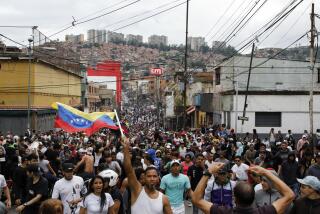Democratic Symbols in Paraguay
- Share via
There were few surprises in Monday’s election in Paraguay, but there was lots of democratic symbolism. And, at least for now, symbolic democracy may be all one could hope for in a small nation that for the past 35 years has been the archetypal Latin American dictatorship.
In peaceful, and even celebratory, balloting, large numbers of Paraguayans turned out to elect a new president and congress just three months after a military coup overthrew Gen. Alfredo Stroessner, who had almost single-handedly controlled the nation since 1954. But while it looked like democracy in action, the results indicate that little is likely to change in Paraguay as a result of the voting, at least in the short term.
The man elected president with 74% of the vote is the same general who ousted Stroessner, Andres Rodriguez. And Rodriguez loyally served the dictator until Stroessner tried to maneuver him out of power. The faction that nominated Rodriguez, and won control of the two houses of Congress, is the same Colorado Party that willingly nominated Stroessner for president in several sham elections he held, providing his government with a democratic facade. And the voting was held under the rules set in a constitution written under Stroessner, and with voting lists compiled by his government.
Nevertheless, the election was by most accounts the cleanest that Paraguay has held since Stroessner came to power. More importantly, the voting was preceded by a wide-open campaign in which opposition parties Stroessner once repressed were given wide latitude to criticize the government.
One of the more remarkable, even inspiring, results of the election is the fact that the leading opposition candidate, Domingo Laino, was in one of Stroessner’s prisons only last December. And, with only 90 days to mount a campaign, Laino still managed to win 20% of the presidential vote and a seat in Paraguay’s Senate.
Immediately after Stroessner’s ouster, Rodriguez pledged to bring genuine democracy to Paraguay. He repeated that pledge often during his campaign, and promised to serve only one four-year term as president as a sign of good faith. Thus far, opposition leaders are taking Rodriguez at his word. Laino and other Paraguayan democrats expect genuinely honest elections to be held in 1993, and believe they will make a bigger impact then. “This is a rehearsal,” one young man told Times correspondent James F. Smith. “These are not going to be democratic elections, but they can serve democracy.” One hopes he is right, and that the optimism about the future of democracy in Paraguay is not misplaced.
More to Read
Sign up for Essential California
The most important California stories and recommendations in your inbox every morning.
You may occasionally receive promotional content from the Los Angeles Times.













